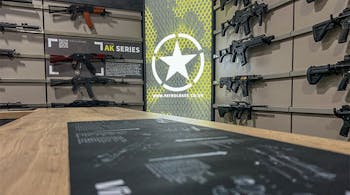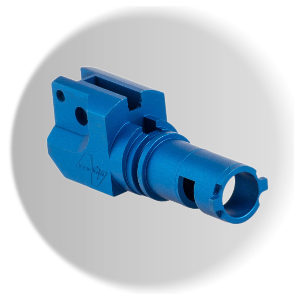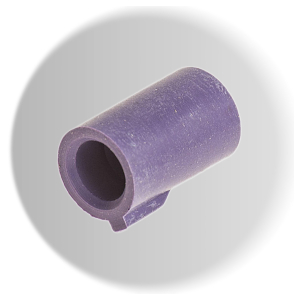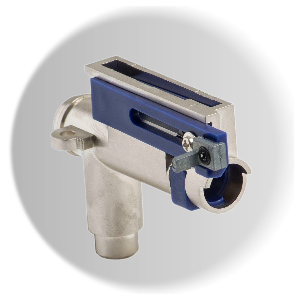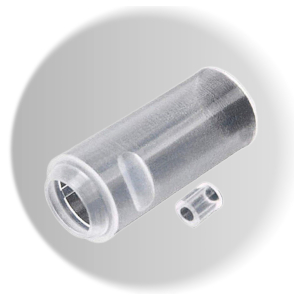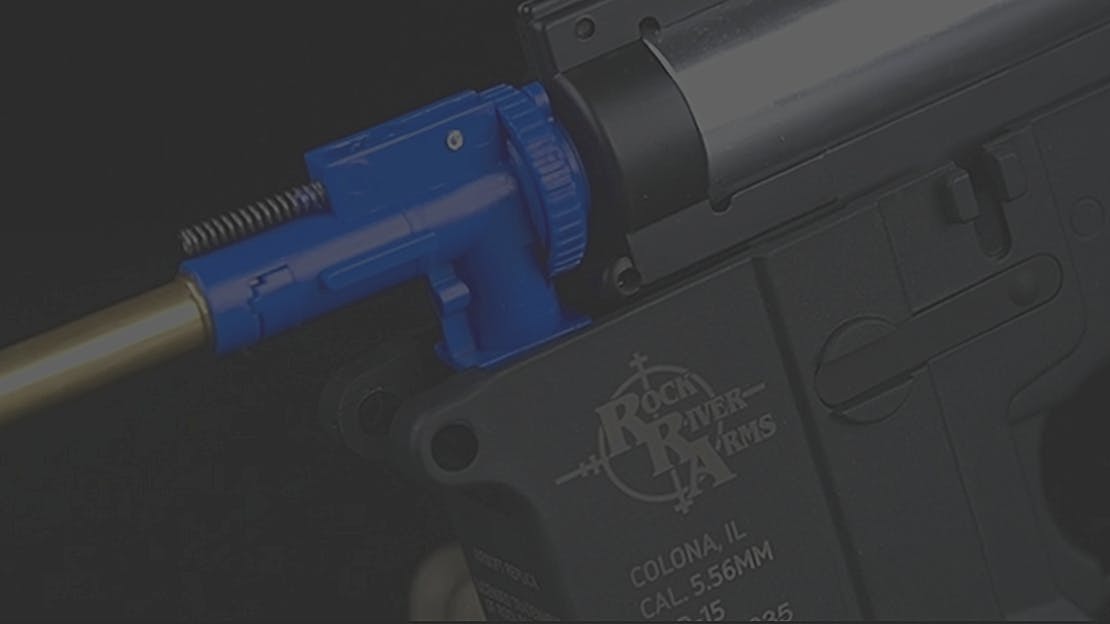
Beginners' Guide: Airsoft HOP-Up Bucking - What is a HOP-up?
The terms ‘HOP-up’ or ‘HOP-up bucking’ are mentioned regularly in airsoft and as a player, it’s important to know what one is and how it functions. We’ve put together this handy hop-up bucking guide so you can find out everything you need to know. You’ll learn how to choose the best HOP-up unit, so you can tune your AEG perfectly and get the best bang for your buck.
What is a HOP-up?
The HOP-up, or ‘HOP’, inside your AEG, Sniper rifle or GBB provides backspin to the BB as it enters the inner barrel, allowing the BB to travel further and with greater consistency. There are two main types of hop-ups available, either AEG type or GBB/VSR type.
How does a HOP-up work?
When a BB is loaded, it comes in contact with the HOP-up bucking which causes friction on one side of the BB. This provides backspin to the BB, allowing it to travel beyond the point that a gun without a HOP would reach. As a result, the gun achieves a greater range, while still maintaining non-lethal power levels.
The Science - The Magnus Effect
Put simply, the Magnus Effect is the observable behaviour of a spinning object as it travels through Air, which cannot be observed when the same object is not spinning. This relates to differentials in Air pressure caused by the spin, similar in principle to the Aerofoil effect observed in the wings and control surfaces of an Aircraft. But enough with the Physics lesson, as it relates to Airsoft the Magnus effect can be observed in BBs provided with backspin through contact with a surface which causes friction on one side of the BB (the HOP bucking), extending the range and providing an upwards force allowing the BB to travel beyond the point that gravity alone would have it fall.
HOP-up Terminology Guide
In principle, all adjustable AEG HOP units work in a very similar manner and many share common buckings and nubs. Obviously, if you are fresh to the sport of Airsoft, this doesn't make anything less complicated, so here in this blog we will outline the components of a HOP unit, get you up to date on terminology, and the pros and cons of using particular HOP-units over others. Compatibility-wise, there are two main types of hop rubber/bucking available, either AEG type or GBB/VSR type, and whilst they differ in appearance they provide the same function for each platform. Having such a wide range to choose from may sound daunting if you’re new to Airsoft, so we’ve included all the terminology you’ll need to know in this hop-up guide.
Bucking/Rubber
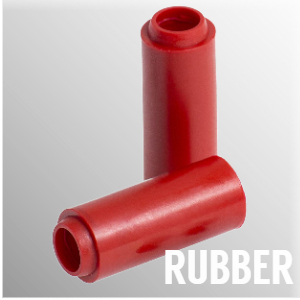
The bucking is the rubber piece that makes direct contact with the BB during firing, providing backspin and extending the range of your shot. These are usually in the form of a small rubber tube of varying hardness that goes over the chamber end of your inner barrel, interfacing with grooves cut in the chamber end of the outer surface of the barrel. The hop bucking you choose will largely depend on what FPS your replica shoots, or your target FPS for your build. The harder the bucking, the more effectively it will apply hop to higher FPS replicas. The reverse of this is also true, as a harder material will decrease the effect of the HOP-up on lower FPS builds.
Nub
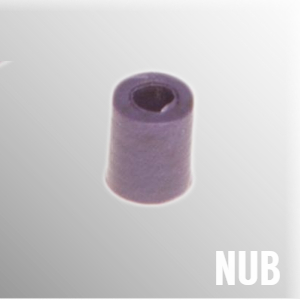
The nub is the component that pushes on the Bucking when it itself has pressure applied to it by the arm and adjuster. This is usually in the form of a tiny plastic or rubber cylinder but can is also offered with a flat surface on one side, or with a groove down the center in more specialized nubs. This part allows the amount of contact the bucking has with the BB to be varied as the nub pushes through the "HOP window", a usually square hole machined into the chamber end of the inner barrel. Variations of HOP nub and their uses can be found below:
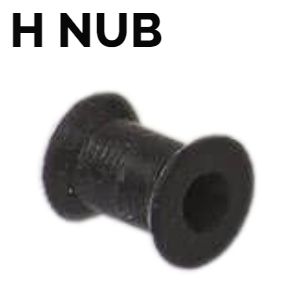
The H-Nub is one of the more common HOP enhancements available. This type of nub is cylindrical but with an hour-glass shape or "H" profile, and aims to provide more stable HOP application by applying pressure evenly to both sides of the BB. These are suitable for any AEG and can be easily installed, with effective results.
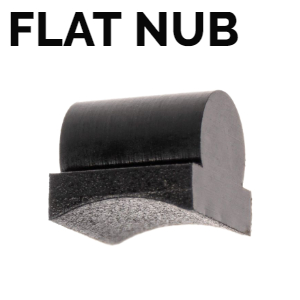
The Flat Hop Nub is a nub with a rounded side, to interface with the adjuster, and a flat side to put pressure on the BB. The theory behind the flat nub is that its larger contact surface will provide greater pressure and allow a greater level of hop to be applied. Flat hop nubs are designed for high FPS builds and DMRs which use heavier BBs by default, but can require a lot of fine-tuning to set up well.
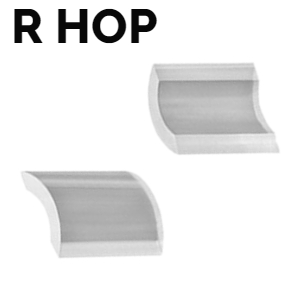
R Hop refers to a small patch of rubber that can be installed over the inner barrel window before the bucking is installed and effectively increases the HOP effect by adding further pressure to the BB. These patches usually need attachment with glue and are prone to failure, but provide a significant increase in range and accuracy when done right.
Adjuster
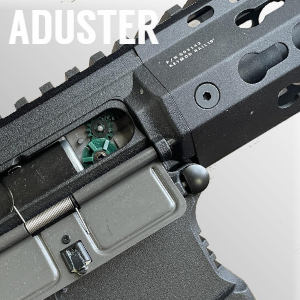
The Adjuster is the part you will physically turn or move, to increase or reduce the amount of HOP up force applied to your BB. This can be found in several forms. The more common types found on AEGs are the Gear, Rotary, and Slider. These are generally found either in or near to the chamber area of your Airsoft AEG and are sometimes concealed behind a small door or the mock bolt carrier should your AEG have one. The most common types of adjusters are listed below:
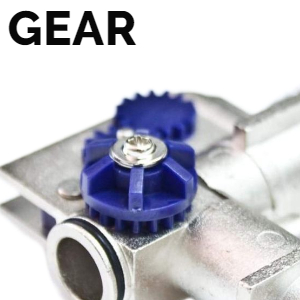
Gear Adjuster - The most common type of adjuster for M4/AR15 platform AEGs. Gear adjusters are easy to adjust quickly but are not as easy to adjust in fine increments. The gear adjuster is one of Tokyo Marui's earliest designs, and as such it has a plethora of replacement enhanced units available and has proven itself reliable over its nearly 3 decades of use. Gear adjusters can also be found in some HK33 and SMG5 replicas. Gear adjusters are also prevalent in GBB pistol replicas, primarily due to the space confines within the internals of a pistol.
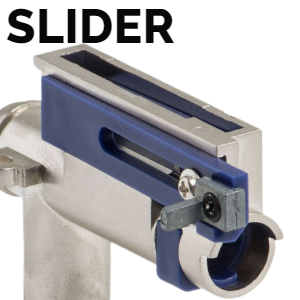
Slider Adjuster - The most common type of adjuster found on AK47/74 replicas. Slider adjusters are not as quick to adjust from zero to full HOP as the gear but provide a greater ability to adjust the unit in small increments. These have been on the market since Tokyo Marui released its AK47, AK47 Beta Spetsnaz, and AK47S in the late 1990s. Slider adjusters are also used on older designs of SMG5 replicas.
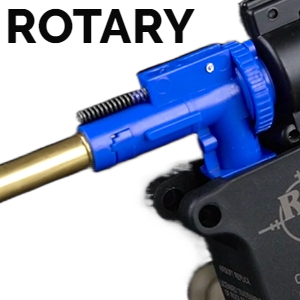
Rotary Adjuster - The rotary HOP unit was first used on the Tokyo Marui AUG AEG and has since found its way into the majority of AR36, P90, AUG, and G3 AEGs. The Rotary HOP adjuster allows a great middle-ground between quick adjustment and accurate fine adjustment and applies pressure on the nub directly from above. This minimizes the possibility of applying uneven pressure to the nub which is a common cause of inaccuracy at long range. The Rotary unit is widely regarded as the best design for these reasons, and more recently designed M4/AR15 AEGs now features a Rotary type adjuster.
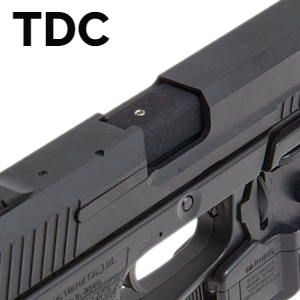
TDC Adjuster - TDC stands for top dead center, meaning the adjuster is positioned directly above the point of contact where the nub meets the rubber. This is most commonly found on sniper rifles and can be added as an aftermarket option to those which don't include a TDC out of the box. TDC adjusters began their life as a homebrew option for accurizing sniper rifles and NBB pistols, and provide the absolute most precise adjustment for your HOP. This comes at a price, however, as TDCs adjust via a grub screw and as such they will need a very small Allen key to adjust, reducing their ability to adjust during an engagement in the field.
Arm
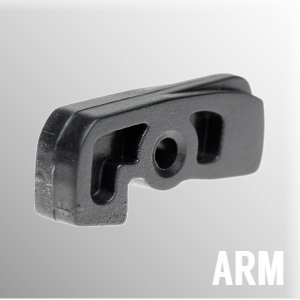
The HOP up Arm is the piece that transfers the pressure from the adjuster to the nub. These are available as reinforced parts, and whilst there is no harm in upgrading this piece as a preventative measure, reinforced HOP Arms would generally be more useful in high-FPS builds which will cause more wear and tear on the Arm by their nature, especially when used with a considerable amount of HOP applied.
Unit/Chamber
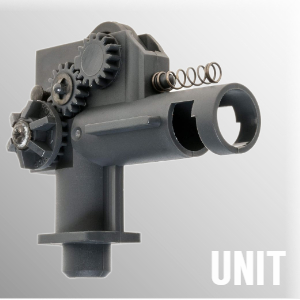
The HOP chamber/unit refers to the piece which receives the BB when the magazine is inserted and houses the HOP parts which apply the backspin to your BB. When shopping, this term is often used to refer to a complete unit and also a bare-bones unit for which you will have to use the small parts from the unit you are replacing. These are available in polymer, Alloy and CNC machined aluminium for various AEG and Sniper rifle platforms. The material you choose doesn't really matter, as the most important thing a hop unit can provide is a tight fit and good air seal. There are advantages to using a metal hop unit, for example, they are less prone to breaking, especially if you use a metal nozzle or a high rate of fire setup, and CNC units provide an immaculate fit which can only really be achieved with precision-engineered parts. For the most part, polymer units function perfectly fine and are often the only part of the HOP set up which I personally don't recommend changing, other than in the case of high rate of fire builds.
Hardness
The hardness of a HOP rubber is a metric for how much backspin the HOP unit will apply to BBs traveling at a certain velocity. Most out-of-the-box AEGs of UK power levels should be using a rubber of hardness between 50 and 60 degrees. Generally, the softer the rubber the more HOP is applied, though this comes at the cost of the softer rubbers wearing out more quickly and often providing too much backspin when used at higher velocity levels. Higher velocity setups may require harder HOP rubbers, as the impact of the BB hitting the hop rubber will be much heavier and may cause tears in softer rubbers. As the Magnus effect depends largely on the velocity of the spinning object, you may find that when upgrading to a DMR level of FPS you will have too much HOP effect, even when using heavy BBs. If this is the case you will need a harder rubber. For standard AEGs firing at around 350 FPS or under, a 50 or 60 degree HOP is what you will need, as any higher may see your HOP effect reduce. If you are upgrading your AEGs hop, the hardness of HOP rubber you will need depends entirely on what you aim to achieve with your setup. The following list outlines the requirements for approximate rubber hardness to match setups firing at a range of FPS.
Recommended HOP rubber hardness / Velocity combinations (0.2g BBs)
- 50 degree: 280-360 FPS
- 60 degree: 295-390 FPS
- 70 degree: 360-460 FPS
- 75 degree: 425-490 FPS
- 80 degree: > 490 FPS
Hop Up Adjustment
To get the most out of your Airsoft rifle you will have to set the HOP unit for the BB weight you are using, ensuring a flat trajectory and thus maximum effective range. In order to adjust your HOP unit, you will need a minimum of 30 meters safe range to shoot, either on your own property or with the property owner's permission, out of public view. Preferably this should be carried out when there is little to no wind, to make the job easier. Of course, you will need the obvious, BBs and eye protection.
The first step will be to load your Airsoft gun with the BB weight you intend to use for Skirmishing, point it downrange, and shoot, paying attention to the trajectory of the BB. If the BB suddenly arcs downwards during its flight you have been a victim of gravity, and you need to increase the HOP effect by dialling your HOP unit upwards (some units are marked with +/-, others it will be trial and error). Once this has been done, fire again and observe the trajectory. If the BB now flies upwards, you are now shooting a mortar and you will need to back down on the adjustment. If the BB flies straight and flat, you have achieved a flat trajectory and thus, a perfectly set HOP up. Repeat this process until you have a nice, flat trajectory, and your Airsoft gun is ready for combat.

Our favourite HOP parts
So perhaps you are wondering what we prefer to use in our own Airsoft guns? Sticking to a standard AEG sub-350 FPS setup, my personal preference in bucking/rubber is Guarder Clear 50 degree HOP buckings. These buckings are my preferred choice simply because they have been around forever and have always served me well. Being made from softer rubber, these can handle cold weather without losing too much performance, are decently robust and last for a good length of time, and are fully compatible with the vast majority of nubs available, though Guarder does include a basic soft nub with the bucking itself which works perfectly.
With a Guarder bucking installed I have always been pleased with my AEGs range and consistency, and have found they perform much better than stock HOP rubbers on more affordable replicas and are about the cheapest effective upgrade for AEGs available. As far as nubs are concerned, I prefer to use H style nubs, as I have found they offer a good balance between consistency and reliability. Whilst they may not provide the performance a Flat HOP or R-HOP are reported to have, I have had no issues with jams or compatibility. Since the design is well within the parameters of the original AEG nub design you can drop an H nub into your HOP unit without any risk of having the window in your barrel be too small, or your rubber being too inflexible. That and they require far less care and maintenance than Flat and R-HOP nubs, meaning more time shooting less time messing.
As far as replacement HOP chambers/units are concerned, I am currently using a ProWin AR36 CNC Hop unit in one of my many G36s, and it is performing nicely, providing a slight FPS increase due to the improved air seal from this precisely machined unit. I bought this to replace a unit I accidentally broke during disassembly, and though I generally don't upgrade the unit itself in my guns, I found that the ProWin CNC Hop unit provides enough improved performance and consistency to justify installing in a replica you want to get the absolute best from, particularly if you are building a DMR or other accurized setup.
There you have it! Our guide to HOP-up, what you need to know and how to get the most from the HOP inside your gun. This applies primarily to AEGs, though the principle is the same across all Airsoft Gun types. A more detailed guide to HOP disassembly and installation of rubbers and nubs is yet to come, so until then, good hunting!

